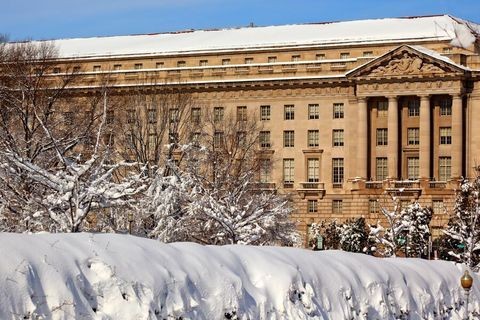Omnibus Spending Bill: Important Impact on U.S. Trade Policy
Client Alert | 3 min read | 03.11.09
The 2009 Omnibus Appropriations Act (H.R. 1105), which passed the House by a 245 to 178 vote on February 25 and the Senate by voice vote (following a 62 to 35 vote to cut off debate) on March 10 and was signed by President Obama on March 11 may significantly impact U.S. international trade policy. The inclusion of provisions that do not merely appropriate but make substantive law in spending bills is nothing new. What sets the FY 2009 Omnibus Appropriations Act apart is the extent to which House and Senate appropriators weighed into the realm of substantive trade policy-making, likely reflecting their differences with members of the committees of jurisdiction (House Ways and Means and Senate Finance) and perhaps foretelling a greater assertiveness on trade policy from members of Congress outside of those committees. In addition to laying down key markers for the course of U.S. trade policy in the foreseeable future, provisions of the bill may significantly affect supply chains for companies with operations in China, Vietnam, India, Mexico and Argentina.
Some of Provisions in the Omnibus Bill (and the related House Explanatory Statement expressly incorporated by reference in the bill text) that will have an impact on trade policy include:
- Pharmaceutical Parallel Imports : Div. B, § 522 prevents U.S. trade negotiators from including in future trade agreements any provision bolstering the right of the owners of patented pharmaceutical products to control the importation of those products.
- Chinese Poultry: Div. A, § 727 prohibits implementation of any rule allowing imports of poultry from China.
- Argentine Pork: Div. A, § 737 prohibits any activities that would allow the importation of swine or swine meat from Argentina.
- Trade Enforcement: Div. B, § 528 prohibits use of appropriated money in a manner inconsistent with objective of preserving and effectively enforcing U.S. trade remedy laws (i.e., antidumping, countervailing duty, and safeguard laws). The House "Explanatory Statement" also requires that Commerce report quarterly to House and Senate Appropriations Committees on travel by investigative teams to China and India for verifications in trade remedy cases.
- Textile Monitoring : The House "Explanatory Statement" encourages the Department of Commerce to "implement proactive trade enforcement activities, including textile safeguard actions with respect to China's World Trade Organization Accession Agreement, bilateral quotas on non-WTO members, and textile provision[s] of the United States preferential programs and agreements." According to the Statement, Commerce is "expected to undertake apparel import monitoring, focusing on prices of imports from China and Vietnam and whether their state-run industries are illegally pricing products and dumping in the U.S. market."
- Mexico Trucking: Div. I, § 136 terminates the Department of Transportation pilot program allowing certain trucks from Mexico to carry cargo into the United States beyond the 20 - 25 mile commercial zone at the U.S.-Mexican border.
Of the bill's substantial group of trade measures, one that has already attracted much attention and is likely to attract even more in the weeks and months ahead is the requirement to terminate the Mexican trucks pilot program. The U.S. Department of Transportation put this program in place in 2007, six years after a dispute settlement panel convened under the North American Free Trade Agreement (NAFTA) found that a blanket refusal by the United States to consider applications by Mexican companies to provide cross-border trucking services breaches U.S. obligations under NAFTA.
In February 2007, the U.S. Department of Transportation launched a pilot program permitting up to 100 Mexican trucking companies to carry cargo into the United States, beyond a 20-25 mile commercial zone at the U.S.-Mexican border, provided that the trucks and their drivers meet rigorous standards. To date, trucks from some 26 Mexican companies have entered the United States under the program.
Mexico already has indicated its intention to exercise its right to retaliate for the U.S. breach of its NAFTA obligation not to discriminate with respect to regulation of the provision of trucking services. According to some reports, the "benefits of equivalent effect" that Mexico would suspend involve approximately $2 billion in trade. Thus, Mexico could raise tariffs on $2 billion in U.S. exports, affecting diverse sectors of the U.S. economy. If the United States believed the retaliation was excessive, it would have to request the convening of another NAFTA panel to resolve that dispute.
Insights
Client Alert | 4 min read | 02.04.26
DOJ Antitrust Division Issues First-Ever Award Under Whistleblower Rewards Program
On January 29, 2026, the U.S. Department of Justice (DOJ) Antitrust Division (Division) and U.S. Postal Service announced the first-ever payment under the antitrust whistleblower rewards program, awarding $1 million to an individual whose information led to a $3.28 million fine as part of a deferred prosecution agreement with EBLOCK Corporation, an online auction platform for used vehicles.
Client Alert | 13 min read | 02.04.26
Client Alert | 2 min read | 02.03.26
Client Alert | 2 min read | 02.03.26
Sedona Model Jury Instructions for DTSA: A Step Forward—But Questions Remain


